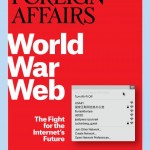Cyberspace has been recognized as a new arena for competition among states ever since it came into existence. In the United States, there have long been warnings of a “cyber– Pearl Harbor”—a massive digital attack that could cripple the country’s critical infrastructure without a single shot being fired. Presidential commissions, military task force reports, and congressional investigations have been calling attention to such a risk for decades. In 1984, the Reagan administration warned of the “significant security challenges” of the coming information age. And just this year, Dan Coats, the director of national intelligence, said of such threats, “the lights are blinking red.”
Yet the Internet has always been much more than a venue for conflict and competition; it is the backbone of global commerce and communication. That said, cyberspace is not, as is often thought, simply part of the global commons in the way that the air or the sea is. States assert jurisdiction over, and companies claim ownership of, the physical infrastructure that composes the Internet and the data that traverses it. States and companies built the Internet, and both are responsible for maintaining it. Actions taken in the public sector affect the private sector, and vice versa. In this way, the Internet has always been hybrid in nature.
MICHÈLE FLOURNOY is Co-Founder and Managing Partner of WestExec Advisors. From 2009 to 2012, she served as U.S. Undersecretary of Defense for Policy.
MICHAEL SULMEYER is Director of the Cyber Security Project at the Belfer Center at the Harvard Kennedy School. From 2012 to 2015, he served as Director for Cyber Plans and Operations in the Office of the U.S. Secretary of Defense.
This article appeared in the Foreign Affairs 2018 September/October edition. It is republished here with permission.
This article was originally published by Foreign Affairs. You can read the rest of the article here.
You can read exclusive content from Gateway House: Indian Council on Global Relations, here.
Copyright © 2018 by the Council on Foreign Relations, Inc.


